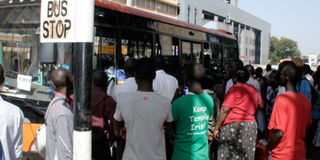What awaits new bus company

Passengers board a Pioneer Easy bus. Plans have been finalised for METU Bus Industries to assemble and manufacture buses that will be deployed to ease transport in Kampala Metropolitan Area. PHOTO |file
What you need to know:
Some operators say Metu buses will have to contend with corruption and informal nature of the transport system.
President Museveni on Wednesday oversaw the finalisation of plans between Kampala Capital City Authority and METU Bus Industries to assemble and manufacture buses that will be deployed to ease transport in Kampala Metropolitan Area.
A statement from State House indicates that the President took over the matter following delays which he blamed on the Ministry of Finance.
State House also reported that the President summoned all stakeholders in a final push to get the project off the ground after three years of bureaucratic red-tape that threatened to sabotage the initiative.
Mr Metu Katabazi, the proprietor of the assembly plant in Kasese, said they would invest $50 million (about Shs177.3b)in the next five years and build capacity to manufacture more than 100 buses including the 4metre city buses, 4.8 to 18 metre long buses for rapid transport.
“The idea of producing buses and trains in Kampala is to lessen crowds and reduce piki piki [motocycles/boda bodas]. If you give me concession to operate Kampala Services, I fabricate and operate here. KCCA doesn’t have to incur costs,” he said.
However, such project is not new to Kampala. Similar attempts by government to address the public transport woes in the metropolitan have yielded negligible success, and numerous challenges still await the new player.
In 2012, Pioneer Easy Buses were famed to end the transport woes; decongest the city, lower transport fares and bring order on the roads.
The Wednesday agreement is reminiscent of the 2012 introduction of numberless Pioneer Easy Buses, following strike by Taxi Drivers in the city.
Whereas the buses, with considerable lower fares for a while seemed to be addressing the issue, their luck would ran out sooner than later.
Reports indicate that government did not fulfill its part of the bargain in the financial arrangement. The imported buses would also suffer a Shs6 billion tax slap from the Uganda Revenue Authority. City Authorities did not provide special lanes for the buses to keep them out of traffic holdups, and operators also complained of stiff competition from 14 seater taxis.
Nearly 10 years on, only a few remain operational as the company chokes on losses.
In 2020, Ministry of Works and Transport said nearly 900 buses, under the Tondeka Metro Bus Initiative, where government promised nearly Shs500 billion, would kick off operations but this remains on paper. The Kira electric buses also remain in the pipeline.
During the Wednesday meeting, Finance minister Matia Kasaija cited a challenge of narrow roads that have caused delayed operation of the buses.
“We had to work on the roads; widen them for the buses to open. If roads are too narrow, it may cause inconveniences and accidents. I also wrote to the bank to inform them that the $12million that was meant for importing buses should be added on the roads,” he said.
President Museveni however said: “What I will not accept are contracts that make you import buses. There is no way somebody can tell me that peripheral roads are more important than factories. How can a planner equate productive capacity with a road especially manufacture of automobiles?”
Mr John Mark Mwanika, of the Amalgamated Transport Workers Union, said the introduction of another player without addressing the current challenges is a wastage of time.
Mr Mwanika said Metu buses will have to contend with corruption and informal nature of the transport system.
“We have been engaging the Ministry of Works on issues that have failed previous attempts. We already have two bus companies who have failed. Introducing buses is what we all want but we have a system that has been dogged by this informality for long and best way to do something sustainable is to work from the bottom up,” he said.
Mr Mwanika added: “There are thousands getting their livelihoods out of this, you have not taken care of that, the likelihood is they will fight the system. You have people who have people who have invested money in taxis, what are you going to do about it?”
Mr Daniel Nuwabine, the KCCA spokesperson said they would work with stakeholders for the success of the initiative.
“The main components of the bus are going to be made here. If the bus gates a problem, the fabricators will be here unlike in the past when most parts of the bus were from outside the country. That is a comparative advantage,” he said
He added: “We are having a major construction project coming up for example the African Development Bank Finance Project has over 70km of roads expanded and upgraded. This shall provide adequate space for the buses to operate”.




